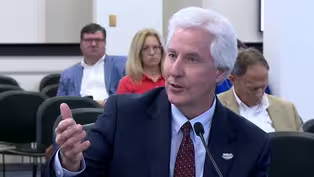
Alcohol and "Forever Chemicals" a Toxic Mix
Clip: Season 4 Episode 37 | 6m 2sVideo has Closed Captions
Study finds heavy alcohol use and "forever chemicals" take a heavy toll on the liver.
We all know that heavy alcohol consumption can cause liver damage. Now, new evidence shows that "forever chemicals" worsen that damage, according to a recent study from the University of Louisville. Our Christie Dutton spoke with two UofL researchers from this study about the health impact.
Problems playing video? | Closed Captioning Feedback
Problems playing video? | Closed Captioning Feedback
Kentucky Edition is a local public television program presented by KET

Alcohol and "Forever Chemicals" a Toxic Mix
Clip: Season 4 Episode 37 | 6m 2sVideo has Closed Captions
We all know that heavy alcohol consumption can cause liver damage. Now, new evidence shows that "forever chemicals" worsen that damage, according to a recent study from the University of Louisville. Our Christie Dutton spoke with two UofL researchers from this study about the health impact.
Problems playing video? | Closed Captioning Feedback
How to Watch Kentucky Edition
Kentucky Edition is available to stream on pbs.org and the free PBS App, available on iPhone, Apple TV, Android TV, Android smartphones, Amazon Fire TV, Amazon Fire Tablet, Roku, Samsung Smart TV, and Vizio.
Providing Support for PBS.org
Learn Moreabout PBS online sponsorshipWe all know that heavy alcohol consumption can cause liver damage.
Now, new evidence shows that forever chemicals worsen that damage.
According to a recent study from the University of Louisville, our Christine spoke with two U of L researchers from this study about the health impact.
And today's medical news.
Here with us today is Doctor Fredrik Bond and Doctor Matthew K from the University of Louisville College of Medicine.
Thank you so much for being here.
Now you both work directly on this study, finding that link between forever chemicals and alcohol related liver damage.
Doctor Yvonne, what did you find in this study?
How did you test it?
Well, thank you for this opportunity.
First off, what we did was using, animal models.
Place them on alcohol diet, concurrent with, exposure to performance, which is, type of, big up for us compounds.
Right?
And we sometimes call them forever chemicals.
PFOA, forever chemicals.
Doctor cave, just so we're all on the same page.
What are forever chemicals and how are we exposed to them?
Yeah.
Great question.
So forever chemicals are a class of literally, literally thousands of chemicals.
And so these chemicals were produced for a variety of industrial applications.
So for example, they make, Scotchgard, Teflon things of this nature.
But many, many more uses to flame retardants, for example.
And so unfortunately, they've, come to contaminate the water supply and the, food chain as well.
And, they are, were used for things like Scotchgard and other applications because they are highly resistant to degradation.
So they don't break down.
And so they last forever, essentially.
And they get into our bodies and last forever.
So forever chemicals in our body are they are.
Do we all have them?
Yes.
Unfortunately.
So, but we can have them to a different degree.
You know, there's many thousands of these, some people may have them to a higher degree than others.
And, you know, recently you was shown kind of leading back to the study that, that forever chemicals that are in drinking water.
And so you can look online and see, you know, what the concentration is.
And Louisville and other municipalities, but there was a recent publication, that came out just before ours that said, well, you know, if, you know, Kentucky being a bourbon state, so if you're making it in this case, it was beer, making beer from in a city that has PFAs contaminated water, the forever chemicals also contaminate the beer.
So hopefully that doesn't apply to Kentucky bourbon.
But we don't know.
Yeah.
So doubling down.
So how worse did it.
Does it make the damage to your liver when you add in the P. Foster the forever chemicals to it.
Is it more than the sum of the two risks.
Yeah.
What we realized was that, while alcohol in itself is a, major factor for alcohol associated liver diseases, current, clinical data has shown that, only about 35% of those, who misuse alcohol have severe, liver effect.
And so that's why we were trying to look at the environmental exposure is contributing towards, the overall liver health, disease progression.
And what we found was that while alcohol alone, generates a lot of, fat in our liver and also causes, liver damage with the introduction of p false.
Together with the alcohol, it's exacerbated this, outcome of, high liver, fatty, composition together with, liver injury, which makes the liver disease, even much more worsened.
Okay, so now that we know this, what are we supposed to do with this information.
Right.
What how do we apply this to our lives.
Yeah.
So you know that's a that's a great question.
And you know, we're still working on this and others.
But I think it's important to know that, you know, that drinking has become a really big problem.
And at always has been.
But, you know, I think as you and probably many of your viewers are aware, became much worse than the pandemic, you know, and so I'm actually a liver physician as well as liver researcher and work with the transplant team at Jewish Hospital.
And, you know, we've seen a big change in the epidemiology of liver disease and much more alcohol related liver disease than we used to when I started 20 years ago.
Also with younger people, men and more women than we used to see as well.
And so, you know, I think it's important to, to, you know, drink in moderation if you drink.
And, we're working on confirming these findings in humans, and it looks like we are going to be able to confirm them.
Preliminarily.
Doctor, doctor K, thank you so much for being here.
It was a pleasure to get to talk to you.
Thank you.
Thank you.
Doctor bond says the next stage of this research will be to determine if men and women are impacted differently by forever chemicals and alcohol related liver disease.
"Designer Xanax" Banned in Kentucky
Video has Closed Captions
Clip: S4 Ep37 | 47s | Gov. Beshear moves to designate Bromazolam as a Schedule I drug. (47s)
Video has Closed Captions
Clip: S4 Ep37 | 3m 21s | Nonprofit introduces young people to the equine industry. (3m 21s)
Fewer Fill-ups Means Less for Roads
Video has Closed Captions
Clip: S4 Ep37 | 1m 48s | Kentuckians are filling gas tanks less, and that's impacting roads. (1m 48s)
Honoring a Kentucky Aviation Pioneer
Video has Closed Captions
Clip: S4 Ep37 | 3m 3s | A special honor for an aviation pioneer from Kentucky. (3m 3s)
Rally Training Facility Coming to Eastern Kentucky
Video has Closed Captions
Clip: S4 Ep37 | 4m 17s | Center to train rally officials. (4m 17s)
Providing Support for PBS.org
Learn Moreabout PBS online sponsorship
- News and Public Affairs

Top journalists deliver compelling original analysis of the hour's headlines.

- News and Public Affairs

FRONTLINE is investigative journalism that questions, explains and changes our world.












Support for PBS provided by:
Kentucky Edition is a local public television program presented by KET




